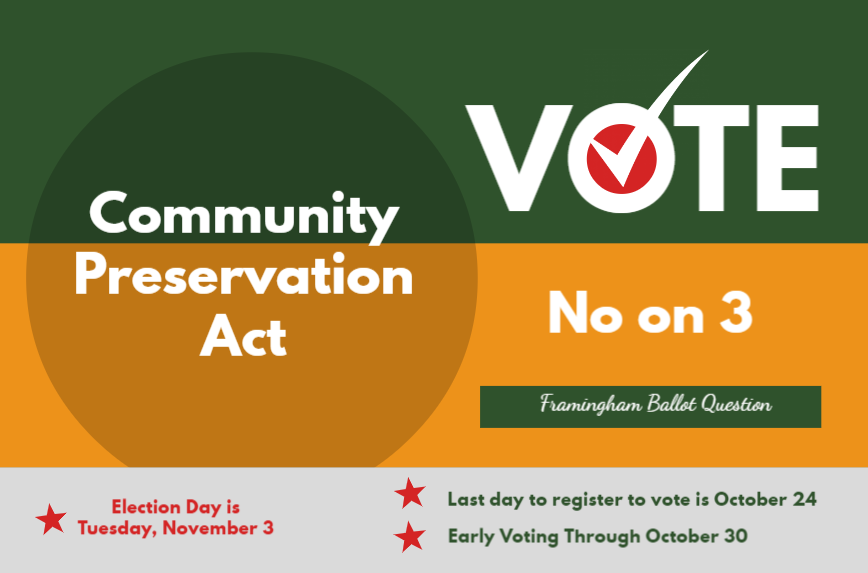By Steve Kruger and Kevin Crotty
FRAMINGHAM – In 2001 a ballot question offered the voters in the Town of Framingham the opportunity to adopt the Community Preservation Act (CPA). Despite the support of most leading political figures in the Town at the time (as we see again now), once the voters were made aware of the CPA’s many drawbacks, the ballot question was defeated convincingly by a more than 2-1 margin.
The same objections to the CPA that applied then still apply today. Only now there is even more reason to reject the CPA.
In 2001 the state was matching 100% of the funds raised locally.
[broadstreet zone=”52093″]
In fiscal 2020 that match percentage was down to about 11%. For fiscal 2021 the state has said the match percentage would increase to about 18%, still far below the match that prevailed in 2001.
The main objections we have to the CPA’s adoption in Framingham are as follows:
- There is no formal statement of specific needs/projects for the areas covered by the CPA (affordable housing, historic preservation, and open space/outdoor recreation). In essence voters are asked to put new tax dollars into a blind pool, not knowing specifically how the money would be spent, but knowing full well that if the money is there it will be spent. This is a classic example of ‘tax and spend’ government (tax first and then decide how to spend the money) that turns off so many voters.
- The City already meets the state’s guideline for affordable housing (over 10%), and has for many years. The City’s bylaws are written in a way that assures we will continue to meet the state’s guideline as future development occurs.
- The City already has a healthy level (over 15% of the city’s total area) of beautiful open space and outdoor recreational amenities which includes Cushing Memorial Park, the Sudbury Aqueduct Linear District (along Farm Pond), the Macomber Estate, the Bowditch Field complex, Callahan State Park, various Sudbury Valley Trustees conservation lands like Henry’s Hill and Wayside Forest, Baiting Brook Meadow Farm, Wittenborg Woods, the Nobscot Scout Reservation, and many other athletic fields and small parks. In addition, the City’s cluster-zoning regulations already allow the Planning Board to preserve significant parcels of land as open space within new developments, at no cost to the city.
- The City already has the ability to consider and act on requests for open space acquisition and historic preservation in the normal capital budgeting process. Some proponents of the CPA argue that the CPA is needed because the kinds of projects it would fund are not high enough priority to compete against other demands for the City’s limited capital dollars. In effect they want to create a parallel system (the CPA) to circumvent our capital budgeting process (and
circumvent Proposition 2 ½) in order to fund lower priority projects. Considering that no persuasive case for need exists, this is a bad idea for Framingham. - The composition of the CPA Committee, which would be responsible for recommending projects to be undertaken, would not be decided until after the voting for the CPA occurs, assuming it is approved. So not only would voters be putting their tax dollars into a blind pool, they won’t even know who will be deciding on how to spend the money.
- The CPA would create a brand-new tax, a surcharge on all property tax bills. There is no reduction in other taxes to offset it. The City already has one of the highest tax burdens in the region on businesses. Adding another tax can only serve to make the City less attractive to new or expanding businesses, or even existing ones.
- There is no sunset provision in the CPA. If adopted the CPA must remain in effect for a minimum of five years. To revoke it after that would require the City Council to vote in favor of revocation. Politicians who willingly give up a funding source are a rare breed, and so it is likely that the CPA’s tax surcharge would be with us for many years.

Nothing prevents the city from undertaking to develop a plan on its own with participation from all the relevant boards, committees and constituencies. The goal would be to identify those items encompassed by the CPA that are truly high priority and not accomplishable through existing means.
Then we would know how much money we need to raise and could determine the size of the surcharge and the pattern of exemptions in a more intelligent manner, and the voters would have a clear idea of how their tax dollars would be spent.
While the CPA makes sense for some cities and towns, it is not a good fit for Framingham as it has been proposed.
Please vote NO on the CPA question.
Steve Kruger is a former Town Meeting member, former head of the Framingham Taxpayers’ Association and long-time resident of Framingham.
Kevin Crotty is a former long-serving Town Meeting member and lifelong resident of Framingham.
[broadstreet zone=”58610″]

